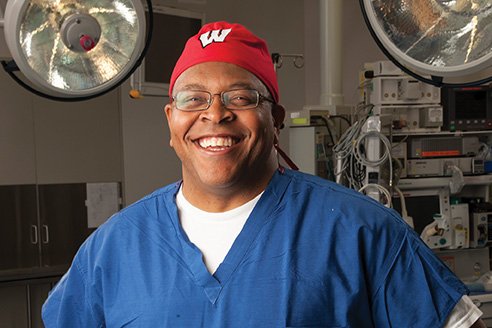Accomplishing Greater Things, Together
Cal Lutheran's 2019 Outstanding Alumnus has never been one to shy away from a challenge.

From Cal Lutheran running back to hardworking medical student to accomplished physician, Tracy M. Downs '88, M.D., has never been one to shy away from a challenge. In his current position as associate dean for diversity and multicultural affairs at the University of Wisconsin-Madison, Dr. Downs has an ambitious goal—to increase the number of underrepresented medical students, faculty and medical researchers. The opportunity was so great that he left his academic job in sunny California and braved the Wisconsin winters to take on the challenge.
The two prongs of his efforts at UW complement each other, he says. And what’s more, “it creates an awesome environment for students to learn.”
Citing Cal Lutheran’s efforts in promoting diversity, Dr. Downs notes that there is a critical time frame in college and medical school where underrepresented students can experience inclusivity. With a lack of diversity in many neighborhoods, these critical interactions can prepare students for success. “Cal Lutheran does it well", he said. He particularly likes the way in which students can be exposed to all cultures as undergraduates.
Dr. Downs’ efforts at UW begin when minority students are accepted into medical school. In their Centennial Scholars program, “we invite them to visit, pay their way, feed them, and have them meet other applicants. We show them specific examples of how we provide mentoring and other opportunities for their success.” The number of visits in this program grew from 32 to 52 in one year, with underrepresented students now comprising 15 to 20 percent of the incoming class.
Yet, there is still more to be done.
One student, a woman of color, felt she was experiencing some unconscious bias and possibly being treated unfairly in her rotation. That student reached out to Downs, who contacted faculty of color in that specialty to gain their perspectives, then offered the student practical ways to navigate the situation. From this and other experiences, the school has added a mentor-mentee program for students.
Another area of focus for Dr. Downs is boosting underrepresented faculty numbers. The BEAM program, Building Equitable Access to Mentoring,” helps M.D. and Ph.D. students, residents and faculty find ways to continue their studies and consider academic careers after graduation. This includes mentoring and financial support as well as making academia attractive.
For many underrepresented students, these programs replace the social support they might not receive from their families. And the programs don’t just benefit minority students but all students. By being part of a diverse medical school class, every student learns to prepare to treat a diverse patient population. “You could fail to connect or offend someone or make a life-saving recommendation and it’s not welcome,” he noted if the physician is not sensitive to cultural differences.
As for the changes at Cal Lutheran, Downs was particularly impressed with the Hispanic Serving Institutions (HSI) designation the university sought. “The goal to do that and be that for the region was brilliant,” he said. “That is going to help so much.” He also commended the efforts of Dr. Juanita Hall and her office for celebrating every culture and providing opportunities to learn in an environment of self-discovery.
He said with a chuckle, “When you look at the numbers, in terms of diversity, it’s not the school I went to.”
“The numbers are small at first—but now you start to see the mightiness of it,” Downs said.
More
- Hispanic Heritage Month Highlight: Diana J. De Schutter '15
October 11, 2021 - Traveling the World & Creating Lifelong Memories
April 28, 20212021 Outstanding Alumni Award Winner
Jane Lee '78 Winter - Trailblazer for Inclusion
April 28, 20212020 Outstanding Young Alumni Award Winner
Benjamin Hogue ’10, MDiv ’18 - Introducing Cal Lutheran's 2019 Alumni Hall of Fame Class
June 18, 2019 - Accomplishing Greater Things, Together
May 20, 20192019 Outstanding Alumni Award Winner
Tracy M. Downs '88, M.D. - The Business of Neurodiversity
December 7, 20182018 Outstanding Young Alumni Award Winner
Oliver Thornton '16 - 2018-2019 Alumni Awards
September 10, 2018Honoring Oliver Thornton ’16, Tracy Downs ’88, M.D., and Paul Hanson, Ph.D.
- Collaborating for Cal Lutheran's Future
May 7, 20182018 Honorary Alumni Award Winner
Siri Eliason - Find the Right Wall for Your Ladder
April 6, 20182018 Outstanding Young Alumni Award Winner
Chris Kajtor '07, MPPA '10 - All Roads Lead to Family (and Coffee!)
November 9, 20172017 Outstanding Alumni Award Winner
Michael Adinew '94